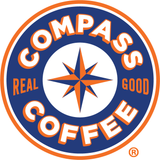What is considered "Fresh Coffee?"
Fresh coffee doesn’t necessarily mean freshly roasted coffee. (In fact, all coffee needs some time to shed the byproducts of roasting in a process called “off gassing” which take a day or two. A good analogy here is with steak: while it might seem great to slice into a ribeye fresh off the grill, it’s best to let it rest for a short while before consuming it so that the flavors settle.) Against most popular opinion, which states coffee closer to the roast date is inherently better, the advent of one-way valves and advancement of packaging processes allows coffee to remain relatively fresh for a long time after roasting. In fact, at Compass, because our tins protect well against unwanted oxygen, they have a shelf life of up to six months!
A good rule of thumb is to only open what you’ll use in two weeks. Leaving opened coffee out for too long increases the likelihood of your coffee going stale. As with almost any consumable product, prolonged exposure to oxygen decreases freshness.
“But, wait” you might ask “what about the refrigerator? That should keep it fresh, right?”
Not exactly. While the fridge is a great place to put your produce to keep it fresher, longer, the compressor in a refrigerator actually sucks moisture from whatever is inside of it. Have you ever left unwrapped cheddar in your fridge? It gets hard and gross.
A lot of the flavor of coffee comes from the essential oils produced in the roasting process after “first crack.” Leaving beans in the fridge or freezer for too long will dry them out and siphon the flavor from the beans.
Fresh coffee is good coffee. Actually, it’s the best coffee.
Use Cold, Filtered Water
While tap water in New York City might make for better pasta, bagels, and pizza, it certainly does not make great coffee...well, without a bit of work. Almost all tap water is contaminated in some way. I don’t necessarily mean this in a negative way. Local and state regulators work hard to test, treat, and make potable every drop of water that makes its way from a reservoir to your sink. That being said, the Safe Water Act acknowledges that anything other than a water molecule is considered a contaminant--even fluoride, essential nutrients, and even naturally-occuring minerals-- and created a guidance regarding the amount of contaminants allowed in drinking water. Even the minute amounts of impurities allowed by law will greatly affect your coffee’s taste.
Starting with cold water is a super small thing that makes a huge impact. When you use hot water, there’s a high chance that you’ll inadvertently be introducing contaminants from your water heater to your coffee. Yes; the goal is to filter your water anyway, but starting with a cleaner base line is always recommended.
Filtering your water is a small step you can add to your brewing process that will elicit drastic changes in the flavor of your drink. Of course, cafes and restaurants use advanced filtering technology to ensure only the highest quality water is used in preparing your drink. At Compass, we use reverse osmosis purification. While these advanced systems are available for your home, they can be very expensive and difficult to install. The three most common modes of purification are counter top, under sink, and pitcher purifiers (like the ubiquitous Brita system). Using something as simple as a Brita filter is enough to purify your water prior to brewing.
Use a scale to accurately measure your coffee
From the most basic Mr. Coffee machines to the specialty Aeropress, most brewing equipment comes with a spoon or scoop designed to dose coffee according to manufacturer specifications. It’s not uncommon to see “Use two scoops for four cups of coffee” or something similar. When making coffee, scoops work to the same extent a shovel does: while they’re great for moving large quantities, if you’re working with something as delicate as a recipe, you want the precision of specialty equipment. After all, chefs and bakers don’t use scoops to measure ingredients for a recipe and the barista at your local café doesn’t use a scoop, so why should you?
The most accurate way to ensure you’re not adding too much (or worse, too little) coffee is with a scale. They can be relatively inexpensive and definitely make the biggest difference when brewing at home. The scales we use at Compass measure out to the half-gram, ensuring that our coffee is measured accurately every time and across all of our locations. Whether you order a medium French Press at the roastery or in Georgetown, you’re getting exactly 25 grams of coffee. Every time.
Even a slight “up dose” or “underdose” will affect the taste of your coffee. Consistency is key. You don’t want to head into your first Monday meeting with weak coffee. Similarly, you don’t want to serve paint thinner to your relatives at Thanksgiving, Christmas, Passover, or during Diwali. You deserve good coffee every time. The only way to guarantee this is by measuring it accurately, with a proper scale.






